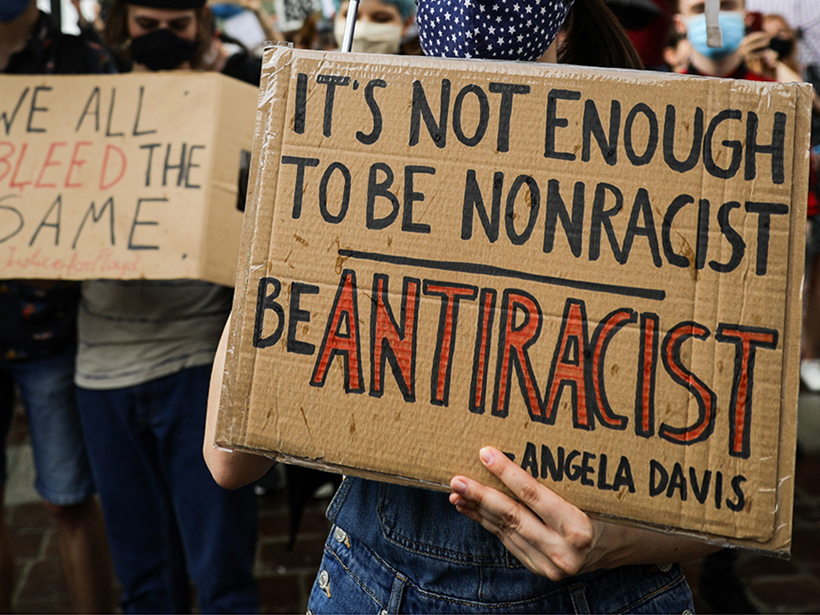A translation of this article was made possible by a partnership with Planeteando. Una traducción de este artículo fue posible gracias a una asociación con Planeteando.
Millions of voices around the world have amplified the call for racial justice in the wake of the killings of George Floyd, Breonna Taylor, Dion Johnson, Ahmaud Arbery, and the uncounted number of Black people throughout the history of the United States. Protesters, activists, and allies are calling for reforms to institutions that perpetuate systemic racism and racial inequality, including those in science, technology, engineering, mathematics, and medicine (STEMM).
“I think a good thing is that geoscientists came out reasonably early in articulating support, acknowledging the problem,” said Vernon Morris, director of the National Oceanic and Atmospheric Administration’s Center for Atmospheric Sciences and an atmospheric scientist at Howard University in Washington, D.C. “The frustrations from within the geosciences community were increasing at the same time as frustrations in general across the nation.”
Morris is a cosponsor of No Time for Silence, a call to action for an anti-racist science community from geoscientists of color. Many membership organizations and academic institutions in the Earth and space sciences (including Eos and AGU) endorsed the statement and responded with plans for reform.
“The level of national protest that we see is not new,” Morris said. “Even the level of protest at the time of a pandemic is not new. The Tulsa riots and the race riots of 100 years ago happened during the Spanish flu. In one sense, [this moment] is unique in that having the science community also step up and say, ‘We support what’s happening in the streets, and this problem is also here,’ and having a parallel effort, those are the things that make this actually unique.”
During these ongoing conversations, the geoscience community and the world at large are reminded that many of the scientific crises of our time, like climate change and environmental conservation, are also racial justice issues.
On 10 June, thousands of individuals, academic institutions, major academic journals, preprint servers, and science organizations (including AGU) participated in #StrikeForBlackLives, #ShutDownSTEM, and #ShutDownAcademia. Participants used the day to listen to and amplify Black voices, learn about anti-racism, share resources on equity, and develop plans to actively combat systemic anti-Black racism.
“There was a lot more solidarity than I expected,” Morris said. “I think there was very broad support and participation at a level that I don’t recall, in my career as a scientist, ever seeing across the science community. And that’s unique. Was it 100%? No. But I think there was a huge support. That, in and of itself, is a statement to leadership” of national funding agencies, science mission agencies, and professional societies across scientific disciplines.
Students Support Change. Change Supports Students
In many instances, Morris said, students and early-career scientists were the ones leading. Many of them signed on to Hendratta Ali’s Change.org petition, urging their institutions and organizations to take action.
However, as astrophysicist Jedidah Isler of Dartmouth College commented on Twitter, “It is not now, nor has it ever been, the most vulnerable folks’ job to fix structural oppression.”
Academic institutions need to do more than recruit more diverse students, experts say. Academia needs to make itself into a welcoming and healthy environment that values the contributions those students make. What’s more, many geoscientists work outside of academia in areas of government or industrial research, Morris noted, two sectors that have been more reticent in their expressions of support for racial justice reform.
The problem of systemic racism in geoscience and beyond has not, by any means, been fully addressed in the few weeks following George Floyd’s death. The protests and calls to action persist. However, the scientific community’s widespread and continuing expressions of support have been good first steps, Morris said, down a road to reform that will take many years to traverse.
“The change that we’re looking for is not a change that’s going to occur on the timescale of these protests. A systemic change is going to have to get rolled back with policy changes, and it’s going to take some attention and vigilance, but it’s going to be from generations of students and early-career professionals gaining access at levels that they haven’t had for the past several generations. And then we’ll begin to see outcomes.”
—Kimberly M. S. Cartier (@AstroKimCartier), Staff Writer
20 June 2020: We’ve updated this article to identify Hendratta Ali as the organizer of the Change.org petition.
Citation:
Cartier, K. M. S. (2020), Geoscience commits to racial justice. Now we’ve got work to do, Eos, 101, https://doi.org/10.1029/2020EO145860. Published on 19 June 2020.
Text © 2020. AGU. CC BY-NC-ND 3.0
Except where otherwise noted, images are subject to copyright. Any reuse without express permission from the copyright owner is prohibited.

